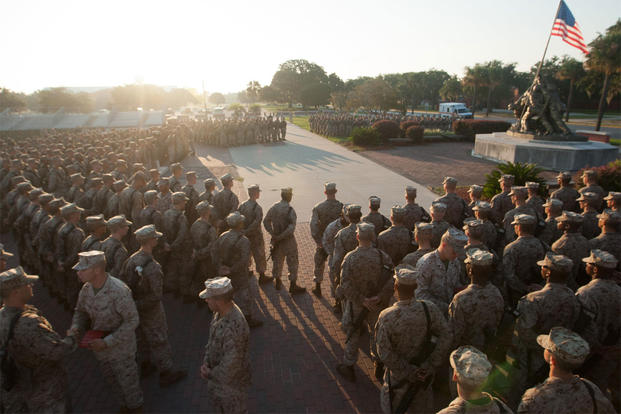Marine recruits at Parris Island, S.C., were dropped from their platoon this year after they were diagnosed with rhabdomyolysis, a serious condition in which the muscles are exercised so extensively that they break down, leading to potential kidney damage and other problems.
But the diagnosis is absent on the drop roster for the recruits and, in one case, the reason listed is pneumonia.
The revelation that boot camp staff tried to cover up evidence of excessive physical training used to haze recruits inside of Parris Island's 3rd Recruit Training Battalion is one of many shocking details in a wide-ranging series of investigations discussed with Military.com this week.
The investigations revealed that a drill instructor's verbal and physical abuse provided the "impetus" for 20-year-old recruit Raheel Siddiqui's suicide, just a handful of days into training.
They also showed patterns of abusive behavior throughout the unit and drill instructors who appeared to know they were doing wrong and bragged they'd never get caught.
The most popular form of hazing, detailed in the investigations, is incentive training, or IT -- physical exercise done for the purpose of inflicting pain on recruits and pushing them to their limits.
Recruits in various platoons within the battalion, investigators found, were unevenly pitted against each other by their drill instructors in Marine Corps Martial Arts Program training, occasionally with injuries resulting. Recruits reported being taken to the "dungeon," an empty squad bay covered in a thick layer of yellow dust, where they'd be made to run back and forth and do burpees while the staff posted a lookout. And they would be made to clean floors with small green "scuzz" pads in physically demanding or stressful positions.
One of the two rhabdomyolysis cases was caused by the latter exercise. One night, after a day of intense physical training including MCMAP, a recruit was ordered to clean his squad bay with a towel in a stress position, without touching his knees to the floor.
After cleaning the floor for nearly an hour, the recruit felt a severe pain in his legs, investigations show. The next day, the recruit had trouble walking. He would later be diagnosed with rhabdomyolysis and dropped from the unit.
The drop roster showed only that the recruit suffered from pneumonia. It's not clear from the investigation whether the recruit opted to recycle and attempt training again after recovery, or how severe his case was.
The investigation into the incident is clear: The diagnoses for this recruit and for the other rhabdomyolysis case were hidden to divert attention from drill instructors who were training recruits inappropriately.
"Failure to include the diagnosis of rhabdomyolysis, an indicator of extreme muscle exhaustion, on the drop roster for [two recruits] was done for the purpose of hiding indicators of widespread unauthorized incentive training," it states.
While incentive training has a place in Marine Corps training, investigators say drill instructors within the battalion resorted to it so often that it became meaningless.
"Incentive training was such a frequent occurrence under the current drill instructor team that it lost its purpose and effects on recruits," the most recent of the three investigations states. That investigation, begun in April after a recruit's parent sent a letter to President Barack Obama via Whitehouse.gov, turned up more than a dozen allegations of recruit mistreatment, and troubling accounts of drill instructors flaunting their abuse of power.
"I've been investigated multiple times; I know everyone on this island. They can't touch me," one drill instructor allegedly bragged to recruits during a period of instruction, adding that he believed he'd never get in trouble for his incentive training methods. Recruits also alleged the drill instructor would drink alcohol and discuss women during time set aside for instruction.
Fifteen drill instructors within 3rd Recruit Training Battalion may now face court-martial or administrative punishment for their role in the alleged hazing and mistreatment of recruits between June 2014 and April of this year.
Investigating officers also recommended that a mandatory interview be conducted with all recruits diagnosed with rhabdomyolysis in the future for the purpose of uncovering instances of unauthorized incentive training.
In a brief interview with Military.com on Sept. 15, Marine Corps Commandant Gen. Robert Neller declined to comment directly on the investigations, as personnel actions are ongoing, but said he did not believe hazing was a widespread cultural issue at the Corps' two boot camps.
"Based on what I've seen and observed and my experience, I don't believe that this is endemic across the institution," he said. "But that doesn't mean that we're not going to make the changes we need to make and we're not going to be alert to these issues in the future."
-- Hope Hodge Seck can be reached at hope.seck@military.com. Follow her on Twitter at@HopeSeck.





























